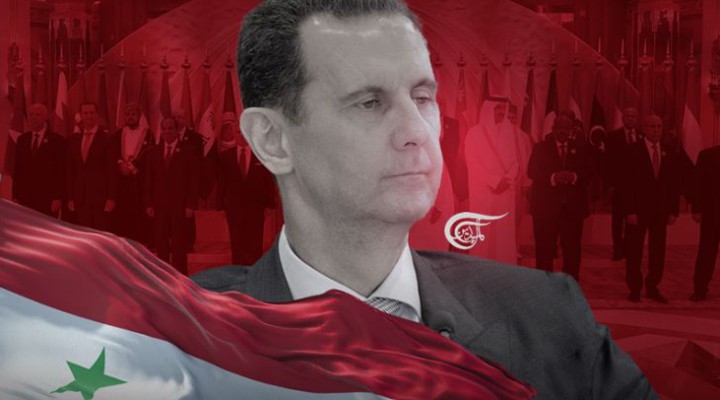The Middle East Stabilises, Against the Backdrop of a Great Unravelling

America’s own structural contradictions of a hyper-financialised economy, sucking the substance from its real-economy host — of a society living in trembling fear of a hospital bill.
The US stands aloof and disconsolate in the wake of the diplomatic revolution in the Middle East. First, China mediated (and guaranteed) a settlement between Saudi Arabia and Iran, and then last week, President Bashar al-Assad strode confidently into the Arab League summit – to greetings and kisses all around. President Assad, after 12 long years of struggle, has been legitimised within the Arab sphere, and is returned as a normal, sovereign state for most of the world.
But a new mood has arisen: Anger is building across the world. To those that have been vilified, sanctioned and attacked in the name of the ‘Rules-based Order’ the message is clear: You are not alone; many peoples are voicing their anger and discontent. The divisive ‘with us’, or (be treated as extremist threat), if ‘against us’ dogma is being overthrown. US foreign policy is crumbling across the Middle East, and in Asia, Africa and South America.
In his speech, President Al-Assad spoke of the opportunity this wave of discontent and anger has provided to the Region to revise its dispositions – away from Western dominance and intervention:
“Today we are facing an opportunity to change the international situation that appears in the form of a unipolar world, a result of the dominance of the West, who lacks all ethics and principles … This historic opportunity requires the Arab World to reposition itself and invest in the positive atmosphere of reconciliation that preceded today’s summit”, Al-Assad added, referring to recent diplomatic initiatives which resulted in Saudi Arabia’s resumption of diplomatic ties with Tehran and Damascus.
President Al-Assad also stressed the need to consolidate Arab culture in the face of “modern liberalism, which targets the innate affiliations of man and strips him of his morals and identity”.
This latter point by Al-Assad — ‘the cultural danger’ associated with contemporary woke liberalism — is noticeably becoming a global theme, as states emphasise the wish to manage lives in their own way of being.
Of course, Syria is not yet sovereign. US and Turkish forces, together with foreign-backed militia, occupy significant portions of Syrian land. Nonetheless, the Arab League’s position on rejecting foreign intervention and their de-facto legitimisation of the Syrian government will assist Damascus in finding a negotiated outcome.
For “Israel”, the prospect ahead is one of radical change, amidst fears of “being left in the dust”. Prime Minister Netanyahu, amidst domestic schisms and continuing protests, has been seeking to downplay these tectonic shifts, and to project an image of ‘business as usual’ to counter the foreign media focus on protests and political turmoil within “Israel”.
Attacking the Palestinians in Gaza helps keep Netanyahu’s Right-leaning coalition intact — as one Israeli commentator wrote: “Killing children brings Israelis together”. However, Netanyahu’s two Israeli-unity mainstays for ‘gathering Israelis around the flag’: hyping the Iranian nuclear ‘threat’, and lauding his achievement of the so-called Abrahams Accord, have both lost their shine.
Firstly, the reconciliation between Iran and Gulf States voids much of the original justification — Arab fear of Iran — for US’ Iran policy. The two former antagonists presently are resolving their differences diplomatically (under Chinese guidance), and exchanging mutual security assurances between them. In any event, Team Biden does not want war with Iran. It has enough on its plate already.
And secondly, Jake Sullivan, on his recent trip to Saudi Arabia, failed to persuade the Kingdom to normalise with “Israel”. Arab States at the summit rather, are emphasising the 2002 Arab Peace Initiative which precludes normalisation with “Israel”, until a Palestinian State has come into existence. The States which have ‘normalised’ will continue in the same mode, but the conceptual structure of the Abraham Accords (from the Israeli perspective) is entirely hollowed out. Arab States are busy opening diplomatic and trade channels with Iran; they are no longer manning an anti-Iran axis on behalf of Washington and “Tel Aviv”.
Were we to stand-back and see Regional events in a wider arc, we might notice two things about the global situation: The first is that “Israel’s” present travails, and signs of a putative unravelling of the project, spring not, as its leaders and external allies incessantly have prognosticated, from outside forces, but from “Israel’s” own internal unresolved contradictions.
“Israel’s” structural problem is underscored by the current, bitter stand-off over Netanyahu’s plan for Judicial Reform. The Israeli Jewish population is split down the middle: Ashkenazi vs Mizrahi; secular ‘balancers’ vs ‘Jewishness’ exclusivists — with neither side willing to back down and each claiming to be the ‘more democratic’; and each with a vision of “Israel” that is wholly incompatible with that of the ‘other’. “Israel” rests at the cusp of low-intensity civil conflict.
Similarly, America’s polarisation and deepening political divide, which for some Americans also portends some form of internal secession as the only solution to America’s own putative unravelling, spring not – as its political leaders insist – from outside forces (from Russia, China or Iran), but from its own unresolved contradictions.
America’s own structural contradictions of a hyper-financialised economy, sucking the substance from its real-economy host — of a society living in trembling fear of a hospital bill; of despairing to put their children through college with its exorbitant fees; and a political system in near constant paralysis, a zero-sum confrontation — are self-generated and are not external ‘demons’ (except perhaps, in the depths of the unconscious psyche).
Here is the contrast: The Region is shaking itself free from the divisions and schisms of the past. Western ‘great powers’, however, are sinking deeper into theirs. This confluence is systemically unstable: it represents an imbalance, and likely will lead to a period of sustained turmoil.
 TheAltWorld
TheAltWorld 
0 thoughts on “The Middle East Stabilises, Against the Backdrop of a Great Unravelling”